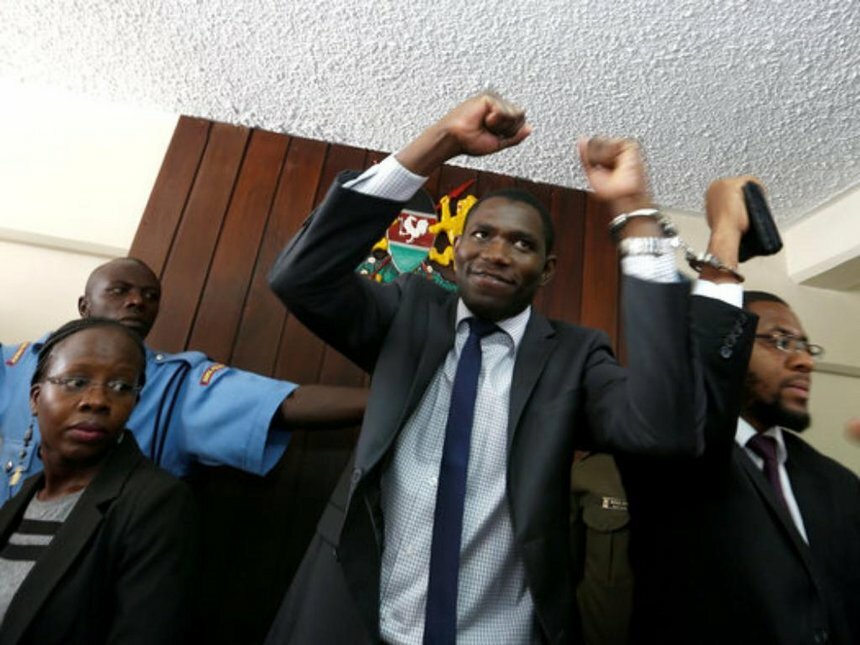Intrigues of Kenya’s longest doctors strike
By Brenda Kiprono
It has been 100 days of street, boardroom, legal, and political battles since doctors countrywide downed their tools pushing for better working conditions and remuneration.
Does the signing of a deal between the national and county governments and doctors cure the troubles in the country’s health sector?
On December 5th 2016, doctors took their battle for better remuneration and working conditions to the streets protesting the alleged failure by government to honor the CBA which they signed with the ministry of health in June 2013.
The deal in 2013 was signed between the then Permanent Secretary in the ministry of health Mark Bor and the Kenya Medical Pharmacists and Practitioners and Dentists Union (KMPDU) prior to the devolution of health care to the counties.
It wasn’t long before their street fight moved to the corridors of justice as the government sought to have the strike declared illegal.
At the industrial court things did not seem to favour the doctors as Justice Hellen Wasilwa declared the strike illegal on grounds the CBA was not signed and registered with the labor relations court ordering the doctors to call off the strike. It was a ruling that went unheeded.
This was to mark the start of a long battle with government as doctors remained adamant they will only return to work upon implementation of the CBA.
On December 7, 2016, The council of governors moved to court to file contempt of court charges against KMPDU officials for failing to honor the court’s decision declaring the strike illegal and have the officials call off the strike.
Amid the legal battles the national Government moved the conversation to the boardroom, in a bid to unlock the stalemate.
The efforts bore no fruits instead appearing to create a rift between the cabinet secretary for health Cleophas Mailu and his Principal Secretary Nicholas Muraguri.
CS Mailu shocked the senate health committee probing the doctors strike when he accused his PS of insubordination and sabotaging the negotiation talks with government.
The talks between the Council of Governors, Ministry of Health and KMPDU collapsed on several occasions as doctors insisted on full implementation of the 2013 CBA.
On December 20th, 2016, the courts persuaded that the talks were headed nowhere issued a suspended one month jail sentence to the union officials for contempt of court.
Justice Wasilwa issued a two week window before sentencing for the conclusion of talks with government.
This failed to bear fruit on two occasions forcing her to jail the union officials for one month on January 26th 2017, and they were whisked away to jail.
This sparked a new battlefront in the health sector as doctors kept night vigil in solidarity with their jailed colleagues.
Doctors in private hospitals also joined in the melee in solidarity with their colleagues issuing notice to withdraw their services for 48 hours until the officials were released.
It was after the sentencing that the coalition of reforms and democracy moved to the court of appeal seeking to have them released from jail to facilitate talks.
February 3rd , 2017, a three judge bench comprising of Jamila Mohammed, Ann Okwengo, and Martha Koome ordered the release of the officials to allow for negotiations.
The court of appeal ordered the talks be spearheaded by LSK, the Central Organization of Trade Unions and the Kenya National Commission on Human Rights.
The talks were shrouded in circus with COTU sec gen Francis Atwoli at one point intimating that the talks had taken a political twist making it difficult to make headway.
March 2nd 2017 the court of appeal included inter religious council to spearhead the talks. KMPDU remained adamant pushing for implementation of the 2013 CBA despite an offer by government to increase their pay by 40% and later 50%.
A hard-line stance that appeared to irk President Kenyatta warned of unspecified action if the talks with religious leaders failed to bear fruit.
It wasn’t long before the national and county government held a joint briefing on Tuesday the 7th of March in which they announced they had withdrawn their offer and ordered doctors back to work.
The action by government appeared to have turned the tables as a section of doctors began trooping back to work while others were issued with sacking letters.
One week after the government withdrew its offer the mediating team was back in court on Monday the 13th and ordered the parties to sign the negotiated CBA by close of business on Tuesday 14th failure to which they would refer the matter back to the industrial court in which the officials would continue to serve their jail term.
March 14th and after 100days of death, pain, despair, negotiations, street and legal battles the doctors’ strike has ended.





